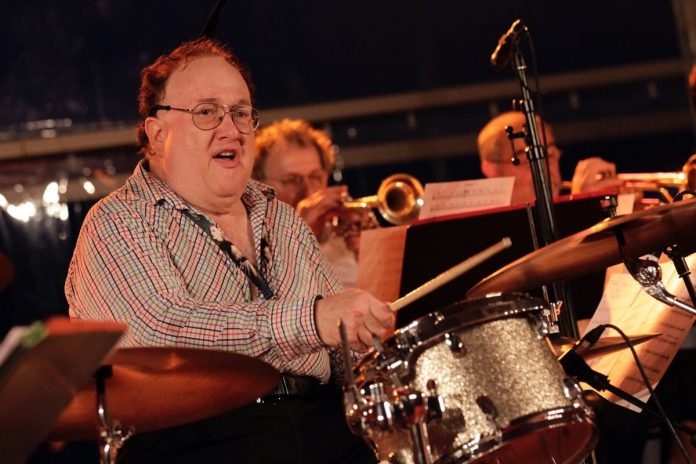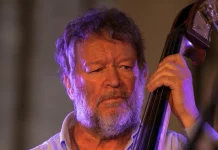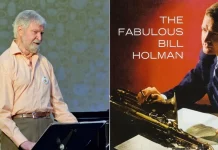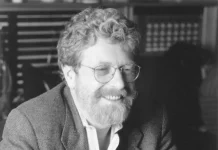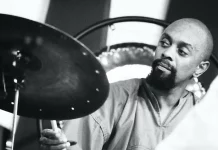There was never any doubt that Duffy Jackson would become a jazz musician, specifically a drummer. The son of a famous jazz bassist, Chubby Jackson, he was given his first lessons at age four by Don Lamond, a colleague of his dad’s in the Woody Herman orchestra. Later reports claimed five years old when he began but Duffy said it was four.
He was named Duff, but friends made it Duffy. He claimed that his dad often yelled at him to get up off his duff and go and find a real job. Jackson wanted no part of any real job, whatever that might be, but he wanted to play jazz and his ambition was to play in the Count Basie Orchestra. He told an interviewer that he was lucky enough to be in London when the Basie band was playing at the Grosvenor House Hotel along with Lena Horne. Jackson was working with the George Wein Festival All Stars but in the evenings, he hung out with the Basie musicians. Shortly after that he received a call from Basie to invite him to join the band.
“I had some issues at the time with some surgeries,” he said, “so I knew I wasn’t up to the travelling, but I said yes straight away.” Duffy had thought he would need to start the next day but it turned out Basie wanted him in eight months’ time. He studied all the repertoire, made cassette recordings of the band and was well prepared when he did start.
Basie drummer Sonny Payne had first encouraged Duffy, getting him up on the bandstand, sitting next to the drums at age seven to Basie’s bemusement. Later he persuaded Basie to let Duffy sit in, which was when Basie first heard him play. Listening to Jackson with the orchestra it is evident that Payne was a major influence on his style, particularly in the way he played the explosive fills that would always kickstart the ensemble. Another helpful influence was guitarist Freddie Green, who advised him to give each beat its full time-value. Freddie reportedly never spoke to anybody, according to Duffy, but he spoke to Jackson, and hugged him when he left the band. At first, Duffy played by ear because he knew all the music by heart, but an orchestra member advised him to study the charts. So, he studied the charts and found that after that he started to play in a more tasteful manner.
Playing in various big and small units as well as with Basie’s orchestra was a long way from playing brushes on the dashboard of his dad’s car at the age of five. But Jackson never stopped learning, claiming that he had great respect for all the swing drummers, including Krupa, Buddy Rich, Louis Bellson and Jo Jones.
“Then one night I heard Elvin Jones fire up the Basie band at Birdland or somewhere. Elvin was really wailing. And I never thought he could play the Basie style.” Maybe Jackson never heard the recording Elvin made playing acoustic guitar with a group of swing musicians.
It was a long journey from the first time Basie invited Duffy to sit in on a gig down in Florida for three days. He hired a car, bought a white shirt and began the 200-mile drive to Florida to replace Sonny Payne who had to leave following a death in the family. Payne told him on arrival that he would play the first night and Duffy could play the next two. So, he played two nights, received Basie’s approval and asked for $200, much to Basie’s surprise. He travelled back, had to pay $190 for the car rental and bought a hamburger with some of his remaining money. “I would have done it for nothing though,” he later admitted.
It was interesting to watch him on video taking part in a drum battle with Lionel Hampton. His flamboyant style was wilder than even Hamp’s, but the master was more varied and inventive overall. What Duffy lacked in skilled invention he compensated for in enthusiasm and wild swinging. He once told an interviewer that he thought far more drummers should be leaders because, as he put it, it all starts with the drums – setting up the groove and maintaining it. If the drummer leads well everybody in the band follows.
Jackson began as a child prodigy making 300 appearances on television between the ages of five and 12. It was called The Little Rascals Show and aired in Chicago and New York. His father was host of the Rascals and at age five Duffy had his picture in Downbeat magazine, billed as a boy wonder. He later went on to play drums with Lionel Hampton, Ella Fitzgerald, Lena Horne, Benny Carter, Sonny Stitt and bassist Ray Brown. At just 20 he became the youngest drummer ever to be hired by Count Basie. He also made one album as a leader, Swing, Swing, Swing on the Milestone label. Pianist Lori Mechem said that playing with Duffy felt like a glove. “His groove was infectious, and his sense of swing was flawless. He truly lived to play and loved everyone to the fullest.”
Duffy Jackson died in Nashville, Tennessee at the age of 67. The cause of death was complications following hip surgery. He is survived by his wife Marina and two sisters Myno Tayloe and Jai Jackson.
He once said he wanted people to go nuts when he was playing. He wanted them to react – if he could still hear himself – and not sit passively in a respectful way. Duffy Jackson certainly went nuts whenever he played.
Duffy Jackson 3 July 1953 – 3 March 2021

